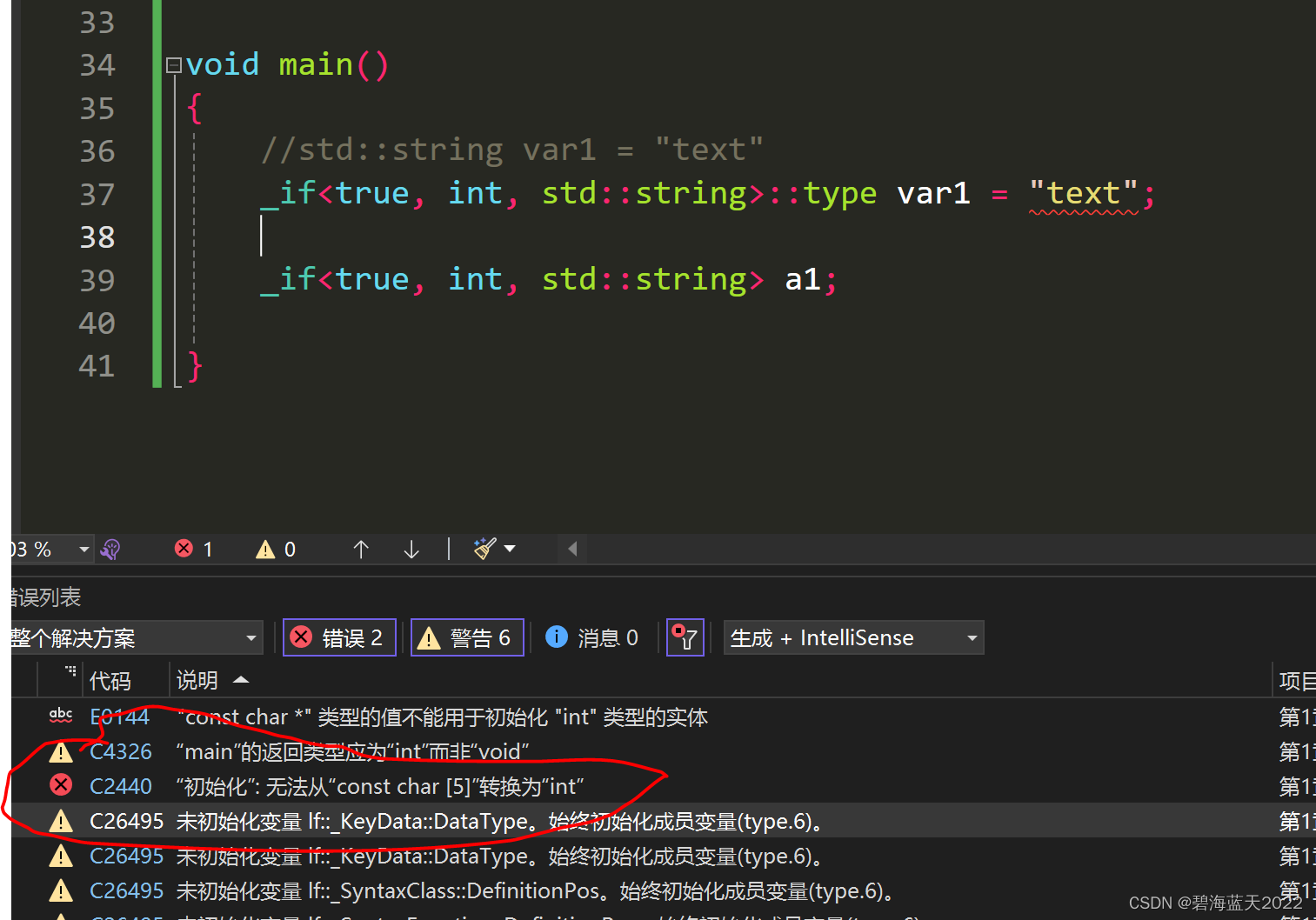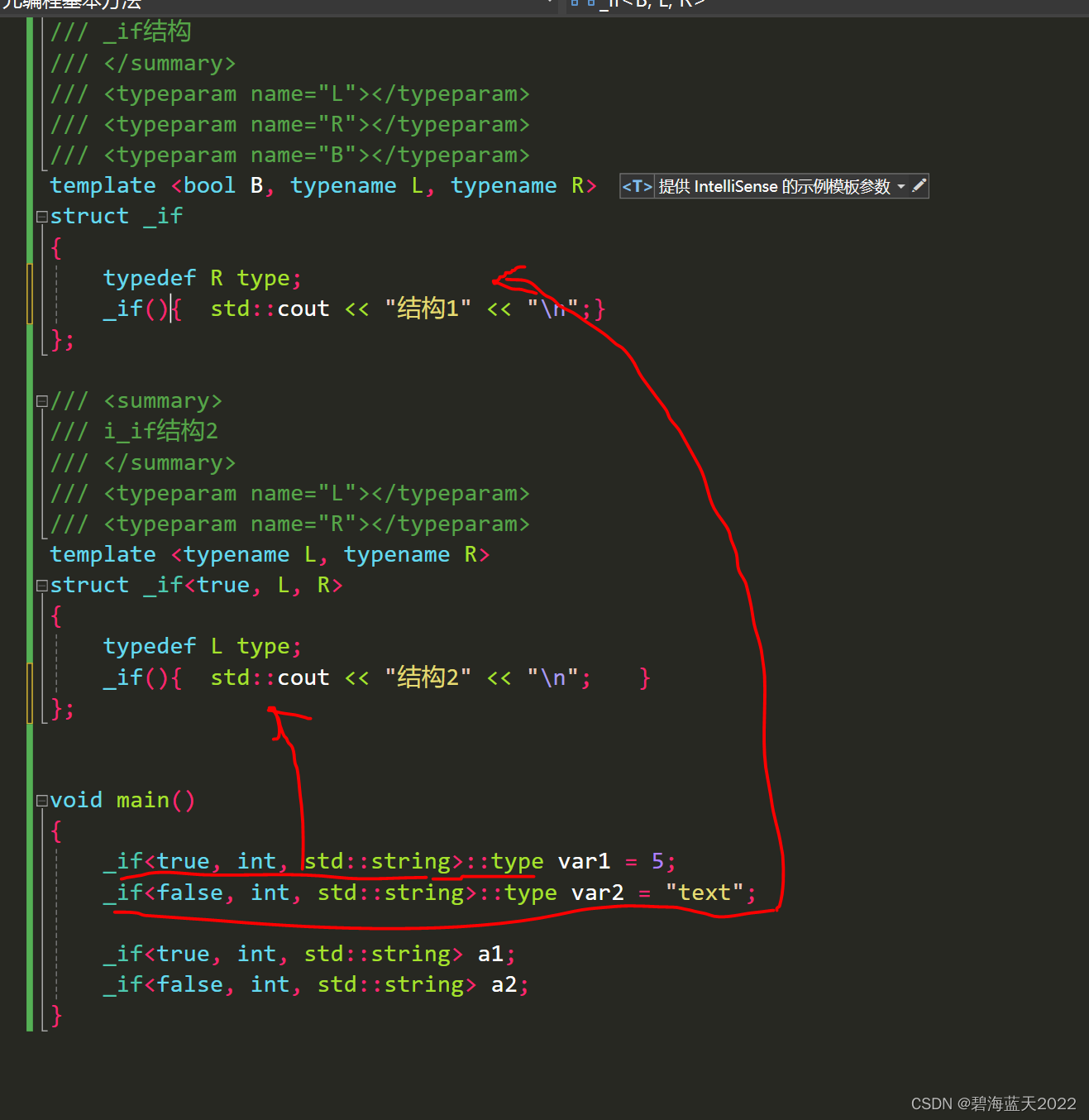模板类结构与元函数
发布时间:2024年01月20日
请看下面元函数_if:
template <bool B, typename L, typename R>
struct _if
{
?? ?typedef R type;
};
template <typename L, typename R>
struct _if<true, L, R>
{?
?? ?typedef L type;
};
?
执行以下代码(1):
#include<iostream>
/// <summary>
/// _if结构
/// </summary>
/// <typeparam name="L"></typeparam>
/// <typeparam name="R"></typeparam>
/// <typeparam name="B"></typeparam>
template <bool B, typename L, typename R>
struct _if
{
typedef R type;
_if()
{
std::cout << "结构1" << "\n";
}
};
void main()
{
//std::string var1 = "text"
_if<true, int, std::string>::type var1 = "text";
_if<true, int, std::string> a1;
}输出:

现在上面代码中再加一个_if结构2
/// <summary>
/// _if结构2
/// </summary>
/// <typeparam name="L"></typeparam>
/// <typeparam name="R"></typeparam>
template <typename L, typename R>
struct _if<true, L, R>
{
?? ?typedef L type;
};
/// <summary>
/// _if结构
/// </summary>
/// <typeparam name="L"></typeparam>
/// <typeparam name="R"></typeparam>
/// <typeparam name="B"></typeparam>
template <bool B, typename L, typename R>
struct _if
{
typedef R type;
_if()
{
std::cout << "结构1" << "\n";
}
};
/// <summary>
/// i_if结构2
/// </summary>
/// <typeparam name="L"></typeparam>
/// <typeparam name="R"></typeparam>
template <typename L, typename R>
struct _if<true, L, R>
{
typedef L type;
};
void main()
{
//std::string var1 = "text"
_if<true, int, std::string>::type var1 = "text";
_if<true, int, std::string> a1;
}执行结果:

为什么编译不过,因为现在用的是结构:

也就是说:_if<true, int, std::string>::type var1 => int (返回整型),修改代码:
#include<iostream>
/// <summary>
/// _if结构
/// </summary>
/// <typeparam name="L"></typeparam>
/// <typeparam name="R"></typeparam>
/// <typeparam name="B"></typeparam>
template <bool B, typename L, typename R>
struct _if
{
typedef R type;
_if()
{
std::cout << "结构1" << "\n";
}
};
/// <summary>
/// i_if结构2
/// </summary>
/// <typeparam name="L"></typeparam>
/// <typeparam name="R"></typeparam>
template <typename L, typename R>
struct _if<true, L, R>
{
typedef L type;
_if()
{
std::cout << "结构2" << "\n";
}
};
void main()
{
_if<true, int, std::string>::type var1 = 5;
_if<false, int, std::string>::type var2 = "text";
_if<true, int, std::string> a1;
_if<false, int, std::string> a2;
}输出:
 这就是元函数_if原理:
这就是元函数_if原理:

?_if 原函数:
template <bool B, typename L, typename R>
struct _if{ typedef R type;};
template <typename L, typename R>
struct _if<true, L, R>{ typedef L type;};
文章来源:https://blog.csdn.net/weixin_42944928/article/details/135720955
本文来自互联网用户投稿,该文观点仅代表作者本人,不代表本站立场。本站仅提供信息存储空间服务,不拥有所有权,不承担相关法律责任。 如若内容造成侵权/违法违规/事实不符,请联系我的编程经验分享网邮箱:chenni525@qq.com进行投诉反馈,一经查实,立即删除!
本文来自互联网用户投稿,该文观点仅代表作者本人,不代表本站立场。本站仅提供信息存储空间服务,不拥有所有权,不承担相关法律责任。 如若内容造成侵权/违法违规/事实不符,请联系我的编程经验分享网邮箱:chenni525@qq.com进行投诉反馈,一经查实,立即删除!
最新文章
- Python教程
- 深入理解 MySQL 中的 HAVING 关键字和聚合函数
- Qt之QChar编码(1)
- MyBatis入门基础篇
- 用Python脚本实现FFmpeg批量转换
- CTF - Web 干货
- Attention-Challenging Multiple Instance Learning for Whole Slide Image(ACMIL)
- 使用国内镜像源来安装 Golang 包:
- 7.26 SpringBoot项目实战【还书】
- Vue3+hooks快速接入Lodop打印插件
- 使用CSS计算高度铺满屏幕
- Redis事务与异步方式
- Expected linebreaks to be ‘CRLF‘ but found ‘LF‘.eslintlinebreak-style
- C语言常见关键字
- uniapp交互反馈api的使用示例